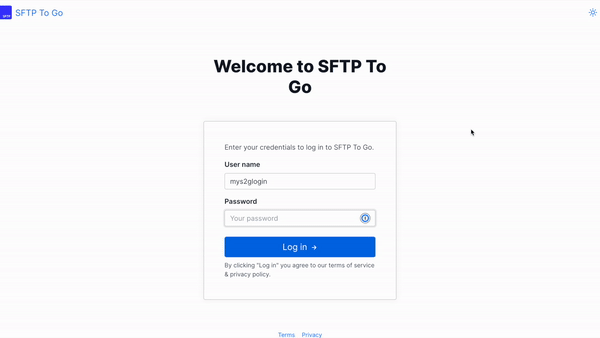HIPAA compliant cloud storage with SFTP transfer refers to secure cloud-based systems that protect electronic protected health information (ePHI) in accordance with U.S. HIPAA regulations.
These solutions combine encrypted cloud storage and secure file transfer protocols—such as SFTP and FTPS—to ensure that healthcare providers and business associates can store and share medical records safely, meet U.S. data residency and compliance requirements, and reduce their legal risk while improving operational efficiency.
For practitioners and institutions in the healthcare and medical industry, including medical financiers, the Health Insurance Portability and Accountability Act (HIPAA) sets stringent standards to ensure the privacy, security, and breach notification of protected health information (PHI).
Examples of PHI include:
- Medical histories
- Test results
- Diagnoses
- Treatment plans
- Health insurance claims and billing information
- Prescription information
- Identifiable information (e.g., names, addresses, birthdates, Social Security numbers, phone numbers, email addresses)
- Medical record and account numbers
- Unique identifying numbers or codes
As a result, healthcare providers are increasingly turning to more secure cloud storage solutions, as ensuring HIPAA compliance is vital to safeguard patient data and avoid costly penalties.
HIPAA violation penalties
Penalties can be crippling, depending on the nature and severity of the HIPAA violation.
In 2015, for example, Anthem, Inc’s non-compliant practices resulted in a breach which later led to a $16 million fine and a court order to pay $115 million in damages. Their one violation resulted in a series of cyber attacks that impacted the ePHI of 79 million people.
Another interesting case is that of Raleigh Orthopaedic Clinic—they incurred a $750 000 fine for failing to sign a BAA with a third party contractor who was hired to digitize their X-rays in exchange for harvesting the silver from their left-over x-ray film. Had they signed the BAA, the odd exchange wouldn’t have been an issue.
Fines can range from the tens of thousands to tens of millions of dollars, with scores of multi-million dollar penalties on record.
This post will help you understand what HIPAA compliant cloud storage and transfer is, its benefits, as well as introducing you to one of the best HIPAA cloud storage and transfer solutions on the market—SFTP To Go.
HIPAA Compliance Basics: Privacy, Security, BAA & Cloud Storage
What is HIPAA?
HIPAA, or the Health Insurance Portability and Accountability Act, is a comprehensive law that safeguards the privacy and security of identifiable health information.
What are the key rules of HIPAA?
- Privacy Rule: Establishes national standards for protecting PHI and grants patients control over their health information.
- Security Rule: Requires covered entities to implement safeguards to protect the confidentiality, integrity, and availability of electronic PHI (ePHI).
- Enforcement Rule: Outlines compliance and investigation procedures, including civil penalties for non-compliance.
- Breach Notification Rule: Mandates notifying affected individuals and, in some cases, the media, if PHI is breached.
Who does HIPAA apply to?
HIPAA applies to any organization or individual that handles protected health information (PHI) under U.S. data laws. These fall into two main categories:
- Covered entities: This includes health plans, healthcare clearinghouses, and healthcare providers who electronically transmit health information. These organizations are directly subject to all HIPAA rules for cloud storage, SFTP transfer, and PHI access.
- Business associates: These are individuals or entities that perform services or functions involving PHI on behalf of a covered entity. This also includes subcontractors that create, receive, store, or transmit PHI. Business associates must meet the same HIPAA compliance standards and sign a Business Associate Agreement (BAA) outlining their responsibilities under U.S. healthcare privacy laws.
Whether you’re a cloud provider, medical billing company, or IT contractor, if you manage PHI for a healthcare client, you’re legally required to comply with HIPAA security and privacy regulations.
What is the HITECH Act?
The Health Information Technology for Economic and Clinical Health (HITECH) Act promotes the use of electronic health records and addresses privacy and security concerns related to electronic health information.
What is the HIPAA Omnibus Final Rule?
The HIPAA Omnibus Final Rule implements extensive modifications to HIPAA to align it with HITECH Act provisions, ensuring comprehensive protection for health information.
To help you navigate the complexities of healthcare data management, we've developed The Complete HIPAA Checklist: Compliance for Healthcare Providers & Business Associates in 2024/2025.
This comprehensive ebook offers a full overview of HIPAA regulations, and step-by-step guidance to ensure your healthcare organization stays compliant and prepared.
Download the Complete HIPAA Checklist for 2024/2025 and take the next step towards securing your organization’s future.
Understanding HIPAA compliant cloud storage and SFTP transfer
HIPAA-compliant cloud storage and transfer refers to secure HIPAA cloud services (HIPAA cloud storage and SFTP cloud solutions) for healthcare, that meet the strict requirements set forth by HIPAA for storing and managing ePHI.
These services tend to include secure transfer and access protocols such as SFTP and S3, but there is more to it than just the most secure protocols. The HIPAA requirements for healthcare data management include data encryption, access controls, audit trails, and regular security assessments. Explore SFTP automation to reduce human error and streamline workflows.
These measures ensure that PHI (Protected Health Information) is protected both in transit and at rest, preventing unauthorized access and data breaches which can cost companies millions and cost patients even more.
To achieve HIPAA compliance, cloud storage and transfer providers must also sign a Business Associate Agreement (BAA) with their healthcare clients. This agreement legally binds the cloud service provider to comply with HIPAA regulations and safeguards.
It makes sense to opt for HIPAA compliant solutions that offer all of these services in one, that need neither be set up, hosted, or maintained at your expense.
Benefits of HIPAA‑Compliant Cloud Storage & SFTP Transfer
Secure storage and file transfer protocols:
HIPAA-compliant cloud storage combines S3, SFTP, FTPS, and HTTPS protocols with strong encryption and access controls. These secure tools support healthcare data privacy laws in the US and help meet the security requirements for HIPAA data storage.
Scalability and flexibility:
Secure cloud storage and management solutions for healthcare offer scalability, allowing healthcare providers to adjust their storage needs as they grow without significant upfront investments. This flexibility is ideal for managing large volumes of patient data.
Improved accessibility and collaboration:
HIPAA compliant cloud transfer and storage solutions can let healthcare providers access and share patient information securely from any location, enhancing inter-departmental and inter-facility collaboration and improving patient care outcomes without risking patient privacy.
Disaster recovery and backup:
Contingency plans are essential in healthcare. Providers of secure cloud storage for healthcare often offer built-in backups and recovery planning so sensitive data stays safe even during outages or cyber incidents. Some services offer a free trial, making it easy to explore HIPAA-compliant cloud storage and see if it fits your organization.
Regulatory compliance and updates:
HIPAA-compliant cloud storage providers stay on top of developments to update their security protocols and comply with evolving regulations. This means that healthcare organizations remain compliant with the latest standards without needing to manage these updates internally. Cloud storage providers that support HIPAA track regulation changes, update security measures, and simplify audit readiness—so you’re not stuck managing these changes yourself.
Read more on how to secure ePHI with hipaa compliant cloud storage and transfer, and HIPAA compliant backup.
SFTP To Go: HIPAA-compliant cloud storage and SFTP solution
The good news is that SFTP To Go offers all of the above in one clean, cloud-based, fully-managed secure transfer and storage solution. for healthcare SFTP offers a convenient and highly secure web portal that’s accessible from anywhere in the world and intuitive even for users with limited IT skills.
SFTP To Go brings a robust and secure healthcare data management solution designed to meet the rigorous requirements of HIPAA compliance. Here’s how SFTP To Go ensures the protection of PHI:
- Data encryption: All communications are encrypted with AES-256 bit encryption using HTTPS, SFTP, and FTPS protocols. At rest, files are encrypted on Amazon S3 with server-side encryption.
- Privacy and intrusion protection: SFTP To Go endpoints only allow access to the necessary ports for SFTP, FTPS, and HTTPS. Multi-factor authentication can be enabled for administrators, and strong password policies are enforced for all users. Additionally, inbound network rules allow IP safelisting for better security.
- Business associate agreement (BAA): SFTP To Go signs a BAA with healthcare providers, ensuring legal compliance and outlining responsibilities for protecting PHI. This agreement is a central compliance factor for entities and business associates handling sensitive patient data.
- Storage durability and high availability: Built on Amazon Web Services (AWS), SFTP To Go makes the most of Amazon S3's durable and highly available infrastructure. AWS guarantees 99.999999999% durability and 99.99% availability—so SFTP To Go does too, making it a reliable choice for healthcare organizations looking for HIPAA compliant patient data management.
- Stringent security standards: SFTP To Go applies strict security standards, including continuous vulnerability assessment, annual pen tests, security measures such as auditing, access management, the use of web application firewalls, and more .
- Regional data hosting: Healthcare providers can choose to host their data in specific regions, such as the United States, to comply with regional data protection regulations.

In conclusion
Selecting a HIPAA-compliant cloud storage provider like SFTP To Go is the first step in helping your healthcare provider service or institution to ensure the security of sensitive patient information.
With its multi-layered security measures, compliance with HIPAA regulations, and reliable scalable infrastructure, SFTP To Go is a comprehensive solution designed to support modern healthcare providers.
If you’d like to learn what our healthcare clients think about SFTP To Go, read our customer success stories.
Download the Complete HIPAA Checklist for 2024/2025 and take the next step towards securing your organization’s future.
Frequently Asked Questions
What is HIPAA compliant cloud storage?
HIPAA compliant cloud storage refers to secure cloud hosting services that meet US data laws for storing PHI (protected health information). These services use encryption, audit trails, and strict access controls to keep patient data safe. Learn more.
How does cloud storage ensure HIPAA compliance?
Cloud storage providers must use strong security measures like AES-256 encryption, multi-factor authentication, and access controls. They must also sign a Business Associate Agreement (BAA) and follow HIPAA security rules for data storage and transfer. See details.
Why do healthcare providers need HIPAA compliant cloud storage?
Healthcare providers need HIPAA compliant cloud storage to protect patient records, avoid fines, and comply with US federal laws. It ensures PHI is handled securely while allowing for safe sharing and remote access. Explore options.
Is HIPAA compliant cloud storage suitable for small healthcare practices?
Yes. HIPAA cloud services are scalable and affordable for clinics and small healthcare teams. They reduce IT workload while keeping patient data secure and accessible. Learn more.
What features should HIPAA compliant cloud storage include?
Look for cloud storage that offers AES-256 encryption, role-based access control, audit logs, BAA support, and SFTP transfer protocols for secure file exchange. See features.
How can I tell if a cloud provider is HIPAA compliant?
Check if they offer a signed BAA, meet encryption and security standards, provide audit logs, and clearly outline their HIPAA compliance in documentation. Check compliance.

